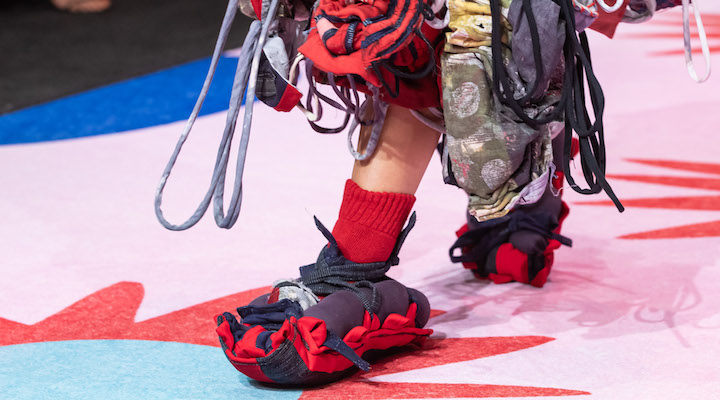For Jordan Gogos and his eponymous brand, Iordanes Spyridon Gogos, sustainability is both a necessity and a trend. He has earned a reputation as an artist and fashion designer while dancing between the categories of multidisciplinary and interdisciplinary – but Gogos is more focused on creating solutions than defining his title. The rise of brands marketing their sustainability efforts has enabled greenwashing to run rampant across the industry. But Gogos remains committed to cutting thr
tting through the noise with couture and ready-to-wear garments that turn waste into fashion.
What sets Iordanes Spyridon Gogos apart from other Australian brands is the relentless environmental purpose its designer brings to its collections.
Sustainability as a design problem
Gogos, founder and designer, told Inside Retail, “I had a really great creative solution in my brain for circularity for the business and I felt really confident moving forward with it.”
In some circles, fashion is a form of art, but Gogos refuses to design for the sake of designing, produce for the sake of producing and sell for the sake of selling.
“It’s so funny because I think so many people forget this, when you’re in school and you study design and tech, the whole thing they tell you is you can’t design without a need,” shared Gogos.
“No, actually design, real design is born out of solving a need,” he added.
He has observed that the glitz and glamour of the industry have created an entitlement amongst designers and brands to produce a garment merely because it’s beautiful.
Gogos is trying to break away from this now industry standard practice to work with new parameters to create a design-forward solution.
“For me, I have waste, which provides a parameter for me to work in, like a design solution, it allows for me to actually think creatively and actually design with a need,” said Gogos.
Iordanes Spyridon Gogos debuted at Australian Fashion Week in 2021 and has since consistently made headlines for its collections made entirely from waste.
Gogos utilised tonnes of fabric off-cuts and compressed them into preliminary versions of his art to line his runway at Australian Fashion Week last year, to remind spectators of what typically ends up in landfills.
The brand has since invested in a machine that can compress the fabric into wall art that Gogos liked which encouraged him to finally produce his ready-to-wear collection that was once exclusive to the runway.
“Instead of having waste and paying for a truck to take it away to the tip, we can actually turn this waste into jobs, into money, into something valuable,” said Gogos.
While some view Iordanes Spyridon Gogos’s collections as avant-garde and otherworldly, others have lessened them to “wild”.
“It’s just so boring hearing how ‘wild’ someone’s designs are because they’re working sustainably. I think it’s wild that you’re not working sustainably,” stated Gogos.
Sustainability as a permanent trend
The demand for sustainable fashion solutions is being pushed forward by consumers but very few designers are answering the call.
“The whole idea of fashion is what’s trending, that’s what fashion means. And what’s trending right now? Sustainability,” said Gogos.
Gogos is on a mission to normalise sustainable fashion and make it relevant so consumers can feel cool when shopping consciously.
“We can’t just be mining out new resources to produce collections for the next 50 years. That’s not possible,” states Gogos.
The National Designer Awards (NDA) dynamised the judging panel for the first time this year with the addition of a sustainability expert.
Lucianne Tonti, the NDA’s first sustainable fashion expert, is also an industry researcher and writer.
Iordanes Spyridon Gogos was an NDA finalist in both 2022 and 2023, but this year was the first year he won the honourable mention for sustainability – despite his brand being rooted in environmentalism since founding.
“I think that recognition for sustainable outcomes should triumph even good design at this point,” said Gogos.
“If it’s not super sustainable it shouldn’t even be recognised because where we are right now, we can’t actually wait,” he concluded.

